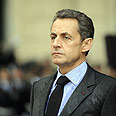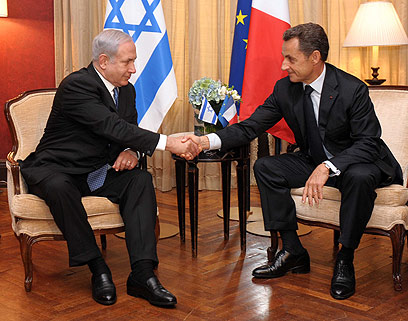
Our friend in Paris
Op-ed: Despite Netanyahu comments, French President Sarkozy a great friend of Israel
Charles De Gaulle, who was fuming over the assassination of a Moroccan opposition figure in Paris with Mossad’s involvement and was also infuriated over the Six-Day War – but who mostly sought rapprochement with the Arab world – aggressively severed the superb ties built by Shimon Peres with Paris.
The French leader ordered a full-blown arms embargo on Israel and referred to the Jews as “this elite people, sure of themselves and domineering.” From the global power closest to Israel, France became a cold, distant friend. His successors were usually perceived by Israelis as no less pro-Arab and hence undesirable Mideast mediators.
Shalit effort
Jacques Chirac did not hesitate to criticize Israel harshly, yet deviated from the European attitude to the war on terror during the second Intifada. Following a lengthy meeting with Prime Minister Ariel Sharon and then-Shin Bet Director Yuval Diskin, he dramatically modified France’s position on Israel’s surgical strikes. Chirac also took significant steps against Iran’s nuclear program.
And what about Sarkozy? Noam Shalit managed to enlist the French president’s support for the cause of releasing Gilad for three reasons, after the issue did not interest Chirac at all.
The first reason is Shira Ansky, an Israeli who resides in France and holds a senior position at a large French bank. For a period of four years, Ansky worked voluntarily and with endless devotion. Thanks to her superb diplomatic skill, Shalit managed to make his way to the French presidential palace and directly to the president’s top advisors.
The second reason is the personal chemistry with Sarkozy. Ansky wrote at the end of one meeting that it was noticeable how impressed the French president was with Noam Shalit’s level-headedness and restraint, as well as his expression abilities and self-control.
Sarkozy and Netanyahu, true friendship?
The third reason is Sarkozy himself. He adopted an unequivocal approach, which was problematic domestically, placing Gilad Shalit as a central issue on France’s agenda. He met with Noam Shalit time and again, and at the conclusion of these sessions granted him the kind of treatment reserved for world leaders, accompanying him to the exit in the face of photojournalists.
Sarkozy told Shalit that France offered a joint mediation effort to Qatar and promised to assist in rehabilitating the Gaza Strip in exchange for Gilad’s release. In the final stages of negotiations, Sarkozy utilized France’s spy agency and Foreign Ministry to press Hamas to resolve a crisis that emerged in September.
On September 13th, according to Ansky’s records, Sarkozy promised Noam that Gilad was under the French president’s patronage and would see no harm. Hurting Gilad would be the same as hurting France, the French president said, while telling Noam that he admires his resilience and inviting him to visit with Gilad (the invitation still stands.)
Tough on Iran
On the Iranian front, Sarkozy has shown a decisive, uncompromising approach; possibly the toughest attitude among all states involved in this issue. French officials feel pangs of conscience over the nuclear assistance offered to Iraq in the past. Sarkozy is translating these pangs of conscience into harsh steps and firm statements.
The bottom line is that the French administration does not adopt an anti-Israeli stance as a basic instinct. The opposite is true: Israel has a friend in the presidential palace. He does not shy away from standing by Israel even on charged issues and truly operates – not only with words – against what is perceived as an existential threat: Iran’s nuclear program.
This support is not unqualified, automatic or free of criticism, and this has to do with the European Union’s conduct, yet it is certainly a positive approach. It’s a pity that Israel’s lack of initiative, coupled with the growing interpersonal rift between Sarkozy and Netanyahu (who made no mention of France in his Shalit speech) overshadow Paris’ favorable approach and prevent us from fully utilizing it.











